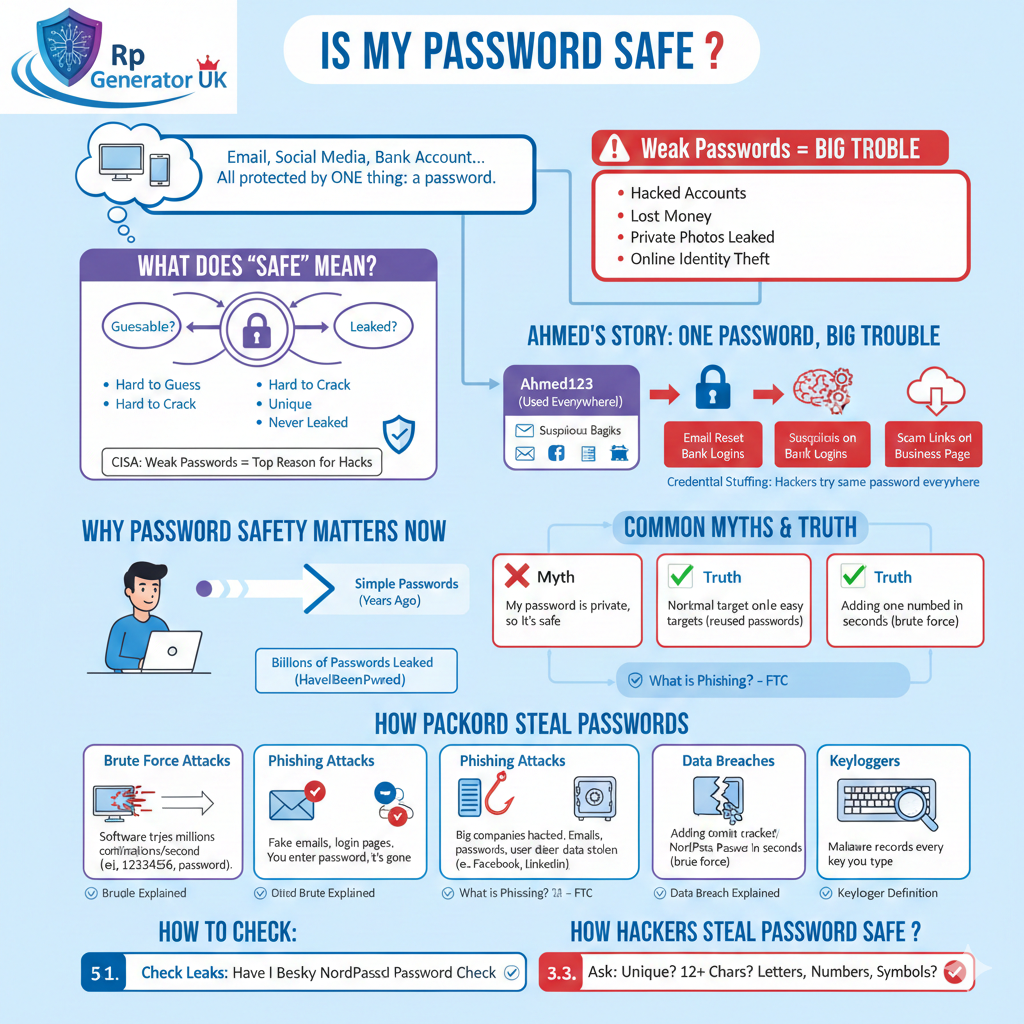Table of Contents
Hi! Do you use easy passwords like “123456” or “MyDog22”? I’ve done that too, and let me tell you, it’s like leaving your door unlocked for hackers. A random password generator is a tool that makes strong passwords that are super hard to guess. In this simple way, I’ll show you why it’s awesome, give you an easy how-to guide, answer your questions, and share tips to keep your online stuff safe in 2025. Let’s jump in!
What’s a Random Password Generator?
A random password generator is a tool that creates secure passwords for you. It mixes letters, numbers, and symbols to make something like “K7#pM9@zL2”. It’s weird, but that’s good—hackers hate it! This is part of cybersecurity, which means keeping your online accounts safe. Think of it as a strong lock for your digital life.
Words About Passwords
You might hear words like authentication (proving it’s you) or encryption (hiding your info from hackers). A random password generator uses a special trick to make complex passwords. Knowing these words helps you see why these tools are great for online safety.
Types of Password Generators:
There are different password generators. Some are online password generators, like Bitwarden. Others are offline password generators for extra safety, and you can even get AI password generators or one-click password generators for speed. They all make strong passwords, just in different ways.
Part of a Bigger Safety Plan
A random password generator is one of many online security tools. Others include password managers (to save your passwords) and multi-factor authentication (like a code on your phone). Together, they keep your data safe, like a superhero team!
Pieces of a Password Generator
A random password generator is part of the cybersecurity world. Its parts are the algorithm (the brain that mixes stuff), the screen (where you pick options), and the password you get. These work together to stop hackers.
How to Use a Random Password Generator: Easy Steps
Want to make a strong password? I’ve tried lots of password generators, and it’s super simple. Here’s how I do it.
Step 1: Find a Good Tool
Pick a safe password generator tool, like LastPass or 1Password. I like free password generators with no ads. If you’re in Europe, make sure it follows GDPR rules.
Step 2: Pick Your Options
Most complex password generators let you choose what you want. Want a long password with symbols? Just click a button. I needed a 16-character password for my bank, and I got “J9#mK2@zP7”. You decide what’s best.
Step 3: Create and Copy
Click “generate,” and you’ll get a unique password. Copy it carefully. Don’t save it in a note on your phone (I did that once, and it was bad!). Some one-click password generators copy it for you, which is cool.
Step 4: Save It Safely
Use a password manager like Dashlane to store it. I use one for all my complex passwords. If you like paper, an offline password generator and a notebook, work too—just keep it safe!
Step 5: Update Your Accounts
Go to your account’s settings and paste the new password. Turn on multi-factor authentication for extra safety. Do this for all your accounts to avoid using the same password.
Other Ways to Say It
Words like secure password creator or strong password generator are just like a random password generator. They mean a tool that makes safe passwords. But weak passwords or making your passwords are bad ideas—they’re easy for hackers. Think “password123” vs “Y8@kL3# zm9”.
Common Phrases
People say things like password safety tips or secure login practices when talking about password generators. These remind us to use tools and habits to keep passwords safe. Using a password generator with encryption is like locking your door and adding a camera.
How It Feels
A random password generator feels safe and helpful. It’s nice knowing your accounts are protected. But weak passwords make me worry. I once got locked out of an email because I reused a password—never again!
Where “Password” Comes From
Long ago, a password meant a secret word soldiers used to get into places. Generator means “to make something.” So, a random password generator is a new way to make a secret code for your online security.
“Generator” Has Other Meanings
Generator can mean a machine for electricity or a tool for passwords. Here, it’s about making strong passwords. Whether it’s an AI password generator or a one-time use password tool, it keeps you safe.
Things That Go With Password Generators:
Tools like password managers, two-factor authentication what-is-two-factor-authentication), and encryption work with random password generators. Apps like NordPass or Google Authenticator make your cybersecurity stronger. I use NordPass to save passwords from Bitwarden—it’s the best combo.
What Most Generators Have
A good random password generator is easy, lets you choose options, and is secure. You can pick a password length or add symbols. These work anywhere, like the USA, UK, or Canada.
Special Features:
Some advanced password generators show how strong your password is, or work offline. KeePass does this, which is great for secure password tool UK users who want privacy.
Unique Features
Some password generators make passwords you can say or follow GDPR rules for EU users. Tools like SecureSafe are special among the best tools for digital security.
Your Questions Answered
Here are answers to common questions about random password generators, from my own experience.
Why Use a Random Password Generator?
It makes strong passwords that hackers can’t guess. My old “MyDog22” password was cracked in seconds during a test. Random passwords are way safer.
Is a Password Generator Safe?
Yes, if it’s a good one. Use a safe password generator like LastPass or a no-login password generator. Skip ones with ads—they might steal your passwords. I check reviews on PCMag first.
How Often Should I Change Passwords?
Every 6–12 months or after a data breach. Check Have I Been Pwned to see if your accounts are at risk. I change mine yearly with a random password generator.
Are Password Managers Safe?
Password managers like 1Password use end-to-end encryption, so they’re safe. They store your complex passwords. I’ve used Dashlane for years with no problems.
How Do Hackers Get Passwords?
They use brute force (guessing lots of passwords) or phishing (fake emails). A random password generator makes long passwords with symbols that are super hard to crack. I saw “password1” hacked in a minute—scary!
Why Password Generators Rock?
Password generators save time, make strong passwords, and stop password leaks. The only downside is needing a password manager to remember them. After reading about cybersecurity threats in 2025 on Kaspersky, I’m all in!
What’s a Strong Password?
A strong password is long (16+ characters), has symbols, and avoids easy words. Random password generators do this perfectly. My old passwords were awful until I used one.
Keep Your Online Life Safe
Use a random password generator, add multi-factor authentication, and follow secure login practices. It’s like locking your door and adding an alarm. I’ve seen friends lose accounts to hackers—don’t let it happen to you.
Final Thoughts: Stay Safe Online
A random password generator is an easy way to stay safe in 2025. With hackers getting smarter, secure password generators are a must. Whether you’re in the USA, UK, Canada, or Europe, these tips keep your accounts safe. I’ve messed up with weak passwords before—don’t do it! Try a free password generator like Bitwarden, use a password manager, and feel good knowing your online security is strong. Ready? Make a strong password now and keep hackers out!


